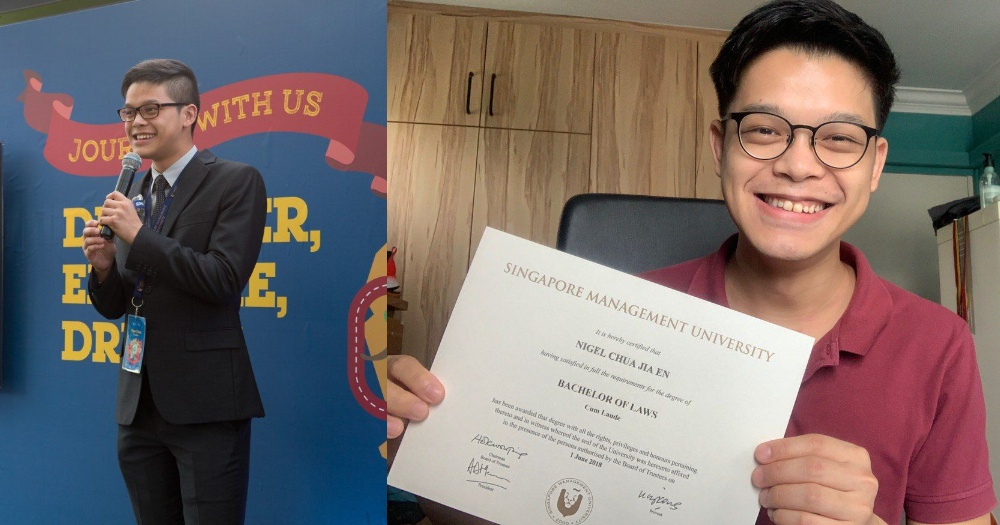With thousands of jobs listed on the job market, even a simple task like job hunting can be quite an overwhelming experience.
This is even more difficult for people who do not know what they want as their first job, or who have educational qualifications that do not match their career aspirations.
If you don't have the necessary skill sets for a particular job or are wondering if you should make a career switch, fret not.
Here, four Mothership staff give the lowdown on why they ended up in a career unrelated to their course of study, as well as how they intend to grow further in their roles.
Chandel Tan, 26
Job Title: Business and Partnerships Manager
Highest Educational Qualification:
- Bachelor of Science in International Hospitality Business with Entrepreneurship, Design and Project Management at Les Roches Global Hospitality Education
- Bachelor of Business Administration in Hospitality Management at Les Roches Global Hospitality Education

I began working for Mothership back in 2017, making a career switch from events sales to a business and partnerships role.
The platform had helped me keep up with what was going on in Singapore back when I was studying in Switzerland in 2015, and I developed a strong attachment to it.
As I personally subscribe to Mothership's style of branding and communication, I was interested to explore career opportunities within the company.
Thankfully, I was working in event sales back in my previous job, so I had sales-centric and customer facing skills that were transferable to my current role in Mothership, where I now sell ads and manage business accounts.
Negotiation is a key feature of what I do in my role, and I want to improve my analytical and interpersonal skills when negotiating business deals with clients.
In particular, I remember a specific incident one or two years back that involved an especially difficult client.
What happened was that this client kept insisting on incorporating a whole chunk of content into a sponsored video we did for him because he wanted to maximise his 'gains' and weave in as many brand mentions as possible.
As our video producer knew that applying such an approach to the content would most likely turn viewers off and affect its performance, he was reluctant to incorporate all the brand mentions that the client had requested for.
In the end, I found it very difficult to persuade the client to agree with our producer's way of doing things because he too had his set of marketing objectives to fulfil and did not understand what would or would not work with our platform's audience.
Although difficult clients aren’t rare in my job, this was one particular incident which made me feel that I should be equipped with better negotiation and conflict management skills to tackle similar occurrences.
While these skills can be honed on the job, there are also many resources out there, such as courses on Negotiation and Conflict Management, for me to take up and further improve myself.
Such a course would train me in the various negotiation strategies needed to guide business partners in seeing things from Mothership's perspective and in understanding the various implications involved if they insist on going ahead with their desired direction.
With better conflict management skills, I would also be better equipped to help our clients obtain the best possible business outcomes, while making sure that the content we produce for them sits comfortably on our platform.
A piece of advice that I would give to those who are like me (with no relevant qualifications for the job that they want), is that the drive to learn and adapt is more important.
After all, I've seen examples of people with history degrees working in investment banking, and people with law degrees starting bakeries.
Nigel Chua, 28
Job Title: Senior Writer
Highest Educational Qualification: Bachelor of Laws at Singapore Management University

I began working for Mothership in June 2018, just two months after I graduated from university.
My background as a law student sparked my interest in the company, as I appreciate how we produce articles that are objective and accessible to the general public.
After four years of law school, I decided that being a lawyer was not the career path I wanted to pursue and jumped at the chance to take up a job at Mothership when the opportunity arose.
As a law graduate, I’m familiar with how to read statutes and legal processes, but I find that my writing can sometimes be overly academic or technical because of my background.
While this is something that I can try to be more conscious of, it would definitely be useful to reframe my “baseline” perspective and learn how to write about current affairs from experts in media and journalism.
There are courses on Multimedia Public Affairs Reporting which I am exploring to help me to improve on my writing and reporting techniques that are needed to cover public affairs on digital media platforms.
If you aren't sure whether to change to your desired career track after spending years studying in an unrelated field, I would highly advise you to avoid falling for the sunk cost fallacy.
Changing tracks may not make sense to many, but it's more important to embark on a career path that's worth it for you, rather than a path that might seem easier or more prestigious.
If you're not passionate about what you're doing as a career, you will require a lot more effort to sustain it in the long run.
Travis Loh, 27
Job Title: Senior Human Resources Executive
Highest Educational Qualification: Bachelor of Arts in Psychology at Singapore Institute of Management
 Image via Singapore Institute of Management (SIM) on Facebook
Image via Singapore Institute of Management (SIM) on Facebook
My career as a Human Resources (HR) executive in Mothership began in February 2019 upon the job recommendation of a university classmate.
It was mainly my interest in a people-centric job which led me to apply for this role, as helping people makes me feel good and gives meaning to what I do for a living.
Now that I'm a senior HR executive, the company's plans for me in 2020 are to be more involved in organisational development as well as talent management for both our department leaders and their subordinates.
To make sure I'm ready for this challenge, I’m looking to pick up courses in Human Resource Management to better equip me in this area and help me to build on my existing knowledge.
Since I don't have a HR degree, an in-depth understanding of Workforce Analytics is also necessary for me to keep up to par with other HR executives in the industry and learn how to make more informed decisions when it comes to my work.
All in all, I believe that upskilling is crucial in any job, and the impact it will have on your work will be amplified if done right.
When evaluating which upskilling course to take, people should have a deep think about how the course would meaningfully contribute or value-add in their current role.
That's why it's a good thing that SkillsFuture has such a huge variety of courses available, because there's bound to be something for everyone.
Tsiuwen Yeo, 27
Job Title: Assistant Director and Executive Producer for Video
Highest Educational Qualification: Bachelor of Arts in Sociology at Nanyang Technological University

I began my journey in Mothership as a writer in August 2016, shortly after graduating from university.
I had wanted to pursue writing in my first job and was extremely grateful when Mothership offered me the chance to do so, not long after I had left my resume with them at a job fair.
When I first joined the company, I was part of a newly established team that focused solely on sponsored content, and was assigned to write advertorials and lifestyle articles.
Over time, the company realised that we couldn't just depend on articles to pay the bills, so we started exploring video as a possible advertising medium.
Even though I didn't have any experience in video production or editing, I was tasked to start making videos.
Thankfully, video editing is a lot like writing in terms of piecing together a narrative with a core element of storytelling, which made me feel like I could take on the challenge.
On the technical end, I also had help in the form of YouTube tutorials and assistance from other colleagues who were more skilled in video making and editing.
While I am largely self-taught in terms of basic video editing skills, I don't think I can do the same for motion graphics as the learning curve is much steeper and there is too much technical jargon involved.
As I am not technically trained, I am not able to fully understand the amount of effort that goes into making changes to motion graphics and would ask for video edits within a time frame that is shorter than possible.
These incidents made me realise that a course on Motion Graphics and Video is absolutely necessary if I want to learn how to better convey my ideas to the video team and understand what they go through during the execution process.
My advice to those who aren't sure about whether to pursue a particular career because they lack the relevant qualifications is that applying for a job is free, so just take the plunge!
Of course, you do need to know how your strengths and interests can help the company and how they will make up for your lack of some skills.
But you know what they say - if you never try, you'll never know.
Upskill yourself and pursue your dream job with SkillsFuture
With SkillsFuture, you won't have to fret about lacking the necessary skills to apply for your dream job.
You'll be able to explore thousands of different courses across different industries, which will definitely help in improving your current set of skills or narrowing down potential career choices.
For starters, you can check out the website's Self-Assessment Tool and Skills Passport.
With the Self-Assessment Tool, you'll be able to better understand your interests and talents, your personal aptitude for learning, as well as how to navigate your professional journey in the workplace.
Listing down your skill sets, certificates and licences on Skills Passport will also come in handy when crafting a resume to impress potential employers.
To get first dibs on updates from SkillsFuture, join their official Telegram channel here.
This sponsored article by SkillsFuture made this writer want to upskill herself.
Top image courtesy of Tsiuwen, Nigel and Chandel
If you like what you read, follow us on Facebook, Instagram, Twitter and Telegram to get the latest updates.
